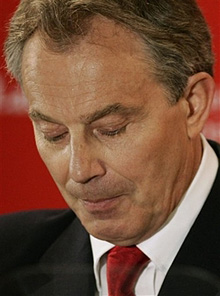 |
 |
 |
 News from Around the Americas | May 2007 News from Around the Americas | May 2007  
Blair: My Political Journey is Over
 CNN News CNN News


| | British Prime Minister Tony Blair looks down at the local Labour club in Trimdon, England, Thursday May 10, 2007, after announcing his resignation as leader of the Labour Party. Blair's resignation will open the way for a leadership contest which is expected to be won by present Chancellor of the Exchequer Gordon Brown. (AP/Phil Noble) |
London, England - British Prime Minister Tony Blair announced his resignation Thursday as Labour Party leader and prime minister after a decade in power.

"I've come back here to Sedgefield, to my constituency, where my political journey began and where it's fitting that it ends," Blair said.

"I've been prime minister of this country for just over 10 years ... I think that's long enough for me, but more especially, for the country."

Blair, appearing relaxed, spoke at his parliamentary constituency of Sedgefield in northeast England and said he would tender his resignation as prime minister to Queen Elizabeth on June 27.

At times, the outgoing PM appeared choked with emotion. He thanked the nation for supporting him during his time in office and apologized for his shortcomings - but not for his actions.

"I ask you to accept one thing," he said. "Hand on heart, I did what I thought was right. I may have been wrong - that's your call."

"But believe one thing if nothing else. I did what I thought was right for our country and I came into office with high hopes for Britain's future and you know I leave it with even higher hopes for Britain's future."

Blair arrived to a cheering crowd of local activists and applause from supporters. Earlier, in London, Labour's longest-serving PM met his Cabinet.

Blair's departure is expected to trigger a leadership election in the ruling Labour Party that will put a new chief in 10 Downing Street by the end of June. (Watch how his announcement is one of the worst kept secrets in global politics )

John Prescott, deputy prime minister, also resigned Thursday.

Moving forward

Britain's powerful finance minister, Gordon Brown, is the favorite to succeed Blair as Labour leader and prime minister. The 56-year-old Scot has been chancellor throughout Blair's tenure.

Blair will not be leaving power until after a leadership election within his party, his spokesman emphasized on Wednesday.

The selection process - which includes a vote of Labour lawmakers, party members and members of affiliated trade unions - is expected to take six to seven weeks, with confirmation by a party conference at the end of June. At that point, Blair will formally submit his resignation to Queen Elizabeth II, clearing the way for Brown to take over as Britain's leader.

Given Labour's majority in the House of Commons, an election is not required.

Blair's legacy

Blair has seen his popularity plunge because of his steadfast support for the U.S.-led invasion of Iraq and political scandal.

He had announced last fall that he would leave office this year but did not give a specific date.

His departure announcement comes a week after Labour took heavy losses in local and national elections in Scotland and Wales.

The Conservatives gained more than 900 local offices in England, and for the first time in 50 years, the independence-minded Scottish National Party ended Labour dominance to become the largest party in the Scottish Parliament.

At the same time, Blair's departure announcement comes the week Protestant Unionism leader Ian Paisley and former arch-foe Sinn Fein's Martin McGuinness, a former IRA commander, were sworn in as Northern Ireland's power-sharing executive. The landmark capped 10 years of Blair's work for peace. (More on his legacy)

Blair, 54, has been at the helm of the Labour since 1994 and led it to an unprecedented three straight election victories in 1997, 2001 and 2005.

CNN's Chief International Correspondent Christiane Amanpour said Blair began his career as a young, dynamic leader with a lot more hair and fewer wrinkles, who "made it cool again to be British, not just noble."

Amanpour highlighted Blair's humanitarian interventionist triumphs in Kosovo and Sierra Leone as well as his commitment to peace in Northern Ireland, saying his achievements were "quite amazing."

But his political fortunes have been weighed down by the Iraq war and an investigation into whether Labour campaign donors were rewarded with coveted seats in the House of Lords. In December, he became the first serving prime minister questioned as part of a criminal inquiry relating to the investigation.

Amanpour said Blair is arguably one of the most successful prime ministers in British history but added that his lack of judgement and the failure of his Iraq policy "is something that will dog him for many years."

"Nobody, perhaps least of all Tony Blair, could forsee Iraq as such a disaster," Amanpour added.

Brown vs. Cameron

Brown does not have to call another election until 2010. But opposition leaders, including the Conservatives' David Cameron, have been pressing for a quick election, arguing that Britain's voters should have a say in picking their next prime minister. Blair's departure, they say, is long overdue.

"Why does the country have to put up with another seven weeks of paralysis?" Cameron asked, calling the government during an exchange in the House of Commons Wednesday one "of the living dead."

Blair, with Brown sitting right behind him, replied, "I'll tell him what I'll be concentrating on in the next seven weeks, and that is policy."

Cameron - whose party is regaining popularity after years overshadowed by Labour - "can be as cocky as he likes about the local elections," Blair retorted, "but come a general election, it's policy that counts, and, on policy, he loses."

Associated Press contributed to this report. | 
 | |
 |



